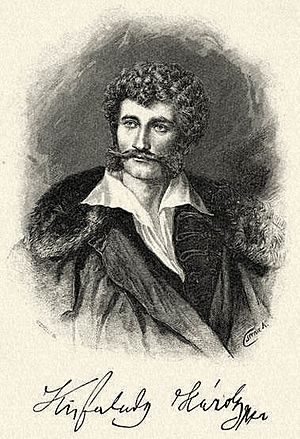Károly Kisfaludy facts for kids
Quick facts for kids
Károly Kisfaludy
|
|
|---|---|
 |
|
| Born | 5 February 1788 Tét, Hungary
|
| Died | 21 November 1830 (aged 42) Pest, Hungary
|
| Occupation | Artist |
Károly Kisfaludy (born February 5, 1788 – died November 21, 1830) was an important Hungarian writer and artist. He was the younger brother of Sándor Kisfaludy. Károly is famous for helping to create a new style of national plays in Hungary.
Contents
Early Life of Károly Kisfaludy
Károly Kisfaludy was the youngest of eight children. Sadly, his mother passed away when he was born. He had a difficult relationship with his father.
From 1804 to 1811, Kisfaludy served in the army. During this time, he started writing poems and songs. He fought in the Napoleonic Wars in places like Italy, Serbia, and Bavaria. After leaving the army in 1810, his relationship with his father became even more strained. He then went to live with his sister Teréz in Vas County.
His Journey in Art and Writing
Kisfaludy wanted to be an artist. He traveled to Vienna in 1812 and later to Italy in 1815 to study art. For a while, he didn't have much success with either writing or painting.
However, things changed in 1819. In April and June of that year, two of his plays became very popular. These were A tatárok Magyarországon ("The Tatars in Hungary") and Ilka, vagy Nándorfehérvár bevétele ("Ilka, or the Capture of Belgrade"). He quickly followed these successes with more plays. These included Stibor vajda ("The Voivode Stiber") and A kérők ("The Suitors") in September. Then came A pártütők ("The Insurgents") in November. The next year, he wrote three more successful plays. His works were even translated into German and performed in Vienna.
Later Life and Legacy
In 1822, Kisfaludy started a magazine called Aurora. This magazine became very important for Hungarian literature. For his work on Aurora, he received the Marczibányi Prize in 1826. In the same year, his father included him in his will again.
Károly Kisfaludy wrote many pieces for Aurora until he passed away. He died from tuberculosis in 1830. After his death, the Kisfaludy Society was formed in 1836 to honor him and his contributions to Hungarian culture.
He is remembered for his exciting plays and clever short poems called epigrams. One of his famous poems is Mohács (1824), which is about the important battle of 1526. A famous Hungarian writer, Mór Jókai, even wrote a story about Kisfaludy's life called Eppur si muove in 1872.
See also
 In Spanish: Károly Kisfaludy para niños
In Spanish: Károly Kisfaludy para niños
 | Sharif Bey |
 | Hale Woodruff |
 | Richmond Barthé |
 | Purvis Young |

